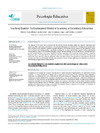Please use this identifier to cite or link to this item:
https://accedacris.ulpgc.es/jspui/handle/10553/77257
| Title: | Teaching quality: An explanatory model of learning in secondary education | Other Titles: | La calidad didáctica: Un modelo explicativo del aprendizaje en Educación Secundaria Obligatoria | Authors: | Ruiz Alfonso, Zuleica León González-Vélez, Jaime José Santana-Vega, Lidia E. González, Cristina |
UNESCO Clasification: | 531204 Educación 12 Matemáticas 5801 Teoría y métodos educativos |
Keywords: | Connection Frequency Effort-Regulation Expectancy-Value Theory Interest Mathematics, et al |
Issue Date: | 2021 | Journal: | Psicologia Educativa | Abstract: | The purpose of this study was to examine the relationship between teaching quality and students’ expectancy-value motivation, effort-regulation, future interest, and connection frequency in mathematics in 1,113 high school students. Data were analyzed using multilevel structural equation modeling, and findings showed support for the hypotheses tested. First, we found that teaching quality – specifically, teaching for relevance, acknowledge negative feelings, participation encouragement, using a non-controlling language, provide optimal challenge, focus on the process, structure the class, provide positive feedback, and caring – predicted students’ expectancy-value motivation. Second, students’ connection frequency, effort, and future interest in math were predicted, at individual and class level, by students’ task-expectancy motivation. Third, students’ connection frequency, effort, and future interest were predicted, at individual and class level, by their task-value in math. Finally, findings were discussed in terms of their applications for educational practice and methodological suggestions for future research. El objetivo de este estudio fue analizar la relación entre la calidad didáctica del profesorado y las expectativas, el valor atribuido a las tareas, el esfuerzo, el interés hacia la asignatura y la frecuencia de las conexiones entre contenidos o situaciones de aprendizaje en 1,113 estudiantes de Educación Secundaria Obligatoria. Los datos fueron analizados evaluando un modelo multinivel de ecuaciones estructurales en el que la calidad didáctica – enfatizar la utilidad de los contenidos de clase, reconocer los sentimientos negativos, fomentar la participación, utilizar un lenguaje no controlador, ajustar los contenidos al nivel del alumnado, centrarse en el proceso, estructurar las clases, ofrecer feedback positivo y demostrar preocupación hacia los discentes – predijo las expectativas y el valor. A su vez, las expectativas y el valor predijeron el esfuerzo, las conexiones y el interés del alumnado hacia la asignatura. Se examinan los resultados en términos de su aplicación para la práctica educativa. |
URI: | https://accedacris.ulpgc.es/handle/10553/77257 | ISSN: | 1135-755X | DOI: | 10.5093/PSED2020A18 | Source: | Psicologia Educativa [ISSN 1135-755X], v. 27 (1), p. 67-76, (Enero 2021) |
| Appears in Collections: | Artículos |
SCOPUSTM
Citations
12
checked on Jun 8, 2025
WEB OF SCIENCETM
Citations
10
checked on Feb 1, 2026
Page view(s) 5
247
checked on Jan 10, 2026
Download(s)
145
checked on Jan 10, 2026
Google ScholarTM
Check
Altmetric
Share
Export metadata
Items in accedaCRIS are protected by copyright, with all rights reserved, unless otherwise indicated.
